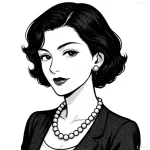“There is no greater insult to a woman than the idea that her beauty is directly connected to a man’s most hideous desires.”

- January 14, 1925 – November 25, 1970
- Born in Japan
- Novelist, playwright, critic, political activist
Japanese
「女の美しさが、男の一番醜い欲望とじかにつながっている、ということほど、女にとって侮辱はないわ」
English
“There is no greater insult to a woman than the idea that her beauty is directly connected to a man’s most hideous desires.”
Explanation
In this quote, Mishima presents a scathing critique of the way female beauty is often reduced to a mere object for men’s desires, particularly the more base and destructive aspects of male lust. He suggests that women’s beauty is often viewed by society as something to be possessed and consumed by men, linking it directly to the ugly, selfish desires of men. Mishima implies that this connection is a form of insult, as it strips women of their agency and value, reducing their beauty to nothing more than a tool for the gratification of male appetites. For Mishima, this dehumanization is the ultimate disrespect toward women, as it denies them the complexity of their humanity and individuality.
This view ties into Mishima’s broader philosophical exploration of beauty, desire, and gender dynamics. Mishima often saw beauty as a double-edged sword—something that is both elevated and burdened by society’s objectification. While beauty is admired, it can also be misused and manipulated by others, particularly in the context of gendered power dynamics. In Mishima’s world, the reduction of women to their physical appearance and the connection of that beauty to male desire is both a social trap and a personal affront to women’s worth. His statement underscores the idea that beauty, when exploited for the gratification of others, is a source of suffering and alienation for women.
In a contemporary context, this quote can be seen as a critique of the commodification of women’s beauty in today’s society, where women’s appearances are often valued over their intellectual or emotional attributes. The objectification of women continues to be a pervasive issue, especially in media, where advertisements, films, and social media frequently reduce women to their physical traits, ignoring their complexity as individuals. Mishima’s words remain relevant as a reminder of the dangers of objectifying beauty, and the harm that comes from reducing women’s worth to the desires of others. His statement calls for a deeper recognition of women’s autonomy and the respect they deserve, rather than being confined to roles that serve only the pleasure of others.
Would you like to share your impressions or related stories about this quote in the comments section?


